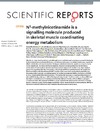Identificador persistente para citar o vincular este elemento:
https://accedacris.ulpgc.es/jspui/handle/10553/44467
| Título: | N1-methylnicotinamide is a signalling molecule produced in skeletal muscle coordinating energy metabolism | Autores/as: | Ström, Kristoffer Morales-Alamo, David Ottosson, Filip Edlund, Anna Hjort, Line Jörgensen, Sine W. Almgren, Peter Zhou, Yuedan Martin-Rincon, Marcos Ekman, Carl Pérez-López, Alberto Ekström, Ola Perez-Suarez, Ismael Mattiasson, Markus De Pablos-Velasco, Pedro Oskolkov, Nikolay Ahlqvist, Emma Wierup, Nils Eliasson, Lena Vaag, Allan Groop, Leif Stenkula, Karin G. Fernandez, Céline Holmberg, Hans Christer Hansson, Ola Calbet, Jose A. |
Clasificación UNESCO: | 32 Ciencias médicas | Fecha de publicación: | 2018 | Proyectos: | Viabilidad y Sostenibilidad Del Adelgazamiento Mediante Tratamiento Intensificado en Pacientes Con Sobrepeso U Obesidad: Mecanismos Neuroendocrinos y Moleculares | Publicación seriada: | Scientific Reports | Resumen: | Obesity is a major health problem, and although caloric restriction and exercise are successful strategies to lose adipose tissue in obese individuals, a simultaneous decrease in skeletal muscle mass, negatively effects metabolism and muscle function. To deeper understand molecular events occurring in muscle during weight-loss, we measured the expressional change in human skeletal muscle following a combination of severe caloric restriction and exercise over 4 days in 15 Swedish men. Key metabolic genes were regulated after the intervention, indicating a shift from carbohydrate to fat metabolism. Nicotinamide N-methyltransferase (NNMT) was the most consistently upregulated gene following the energy-deficit exercise. Circulating levels of N-1-methylnicotinamide (MNA), the product of NNMT activity, were doubled after the intervention. The fasting-fed state was an important determinant of plasma MNA levels, peaking at similar to 18 h of fasting and being lowest similar to 3 h after a meal. In culture, MNA was secreted by isolated human myotubes and stimulated lipolysis directly, with no effect on glucagon or insulin secretion. We propose that MNA is a novel myokine that enhances the utilization of energy stores in response to low muscle energy availability. Future research should focus on applying MNA as a biomarker to identify individuals with metabolic disturbances at an early stage. | URI: | https://accedacris.ulpgc.es/handle/10553/41846 | ISSN: | 2045-2322 | DOI: | 10.1038/s41598-018-21099-1 | Fuente: | Scientific Reports [ISSN 2045-2322], v. 8, article number 3016 |
| Colección: | Artículos |
Los elementos en ULPGC accedaCRIS están protegidos por derechos de autor con todos los derechos reservados, a menos que se indique lo contrario.
